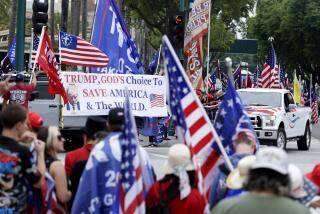Some businesses benefit from government shutdown
WASHINGTON —Those in power are fond of saying that a crisis shouldn’t be allowed to go to waste. But as the government shutdown continues to spread malaise across the country, it’s not congressional leaders who are seizing that mantra but entrepreneurs.
For a select group, the shutdown has become a valuable marketing tool. They are scrambling to make lemonade out of the lemons Congress has lobbed at the American public.
A large insurance company that has a boutique operation selling wedding policies is warning jittery brides and grooms to take note of all those weddings that got unexpectedly canceled at national parks. Privately operated museums in D.C. are seizing on the rare opportunity presented them by the closing of the Smithsonian.
“It’s been a welcome adjustment,” said Jason Werder, a spokesman for the International Spy Museum, where business has been up nearly a third since the Smithsonian closed its doors Oct. 1. Visitors, he said, are lining up to purchase tickets that retail for $20.95 to experience such exhibits as “Exquisitely Evil: 50 Years of Bond Villains.”
Shutdown specials have federal employees streaming into capital bars, some of which are kicking off happy hour in the early afternoon. There is just one group not welcome: members of Congress.
One D.C. bar enticing furloughed workers with a free shot of whiskey offers lawmakers their own deal: “Free water all day. Everything else will cost them double.”
To be sure, those getting a boost out of all this are the exceptions. Most enterprises affected by the shutdown are suffering. A company that runs several golf courses on national park land, for example, recently e-mailed angry customers asking them to please redirect their rage toward Congress. The company is powerless to reopen, the owners noted, and its out-of-work employees, who are contractors, won’t collect back pay as workers on the government payroll are expected to.
Some of those who do see opportunity in the shutdown, meanwhile, admit they have been more successful so far at leveraging free media exposure than securing actual business. That has been the case with Travelers, which has used media frenzy over the shutdown to direct attention to its wedding insurance. Asked whether the company has been getting more calls amid all the heartbreaking stories of weddings at national parks getting called off, company Vice President Ed Charlebois conceded, “really only from the media.”
That has not been the case, however, for the California Department of Parks and Recreation. The agency posted a Facebook notice alerting disappointed visitors to Yosemite, Joshua Tree, Alcatraz and other federal properties in California that state parks are eager for their business. It was shared 40,000 times.
In Atlanta, the shutdown provided excellent packaging for an exhibit opening Friday at the Studio 905 art gallery. The gallery promises that the issues at the root of congressional dysfunction will be explored in a “provocative new, larger than life, nine-piece” collection of spray paint works called “The Divided State of America.”
Back in Washington, there is even more nervous energy than usual, with much of the town’s notoriously high-strung workforce having nothing to do but worry. That is good for those in the business of helping others refocus careers. Amanda Miller Littlejohn, who trains Washington-area entrepreneurs in how to develop, package and market a brand, said she is receiving more queries than ever.
“So many people are starting to think, ‘How can I have multiple income streams?’” she said. “They realize they can’t depend on their one job.”
Even America’s mayors see an opportunity to burnish their brand. The U.S. Conference of Mayors noted on Day One of the shutdown how much better their members are at governing than Congress. Washington Mayor Vincent Gray upped his stock with constituents with a crafty shutdown play: Through some quick-footed accounting, he exempted his congressionally supervised city from the government lapse altogether.
That move created its own entrepreneurial opportunities. Josh Burch, a pro-statehood activist, began selling $15 bright red T-shirts with a map outlining the district and bold white letters screaming “I AM ESSENTIAL AND SO IS STATEHOOD.” All 150 sold out within 16 hours.
The mayor special-ordered 50 more.
“I thought this would be a nice show of unity behind the stand the district was making,” said Burch, who figured some folks in his statehood group would wear the shirts and that would be that. Instead, he said, “I became an unintentional T-shirt salesman.”
More to Read
Inside the business of entertainment
The Wide Shot brings you news, analysis and insights on everything from streaming wars to production — and what it all means for the future.
You may occasionally receive promotional content from the Los Angeles Times.











